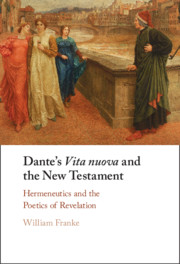Book contents
- Dante’s Vita nuova and the New Testament
- Dante’s Vita nuova and the New Testament
- Copyright page
- Contents
- Illustrations
- Prologue
- Acknowledgments
- Note on Text and Translation
- Chapter 1 Introduction: The Vita nuova as Theological Revelation through Lyrical Interpretation
- Chapter 2 The New Testament Model of Salvific Reminiscence
- Chapter 3 From Appearing and Imagining to Revealing through Interpreting: The Vita nuova’s Hermeneutics of Witness
- Chapter 4 Phenomenology versus Hermeneutics (Debate with Harrison): Revelation as Mediation
- Chapter 5 History of Effect and a New Hermeneutics-Oriented Critical Paradigm
- Chapter 6 Conclusion: The Existential Grounding of Revelation in Lyric
- Coda
- Epilogue: Dream Epistemology and Religious Revelation in Dante’s Vita nuova
- Appendix Italian Text and English Translation of the Vita nuova
- Index
Chapter 4 - Phenomenology versus Hermeneutics (Debate with Harrison): Revelation as Mediation
Published online by Cambridge University Press: 03 September 2021
- Dante’s Vita nuova and the New Testament
- Dante’s Vita nuova and the New Testament
- Copyright page
- Contents
- Illustrations
- Prologue
- Acknowledgments
- Note on Text and Translation
- Chapter 1 Introduction: The Vita nuova as Theological Revelation through Lyrical Interpretation
- Chapter 2 The New Testament Model of Salvific Reminiscence
- Chapter 3 From Appearing and Imagining to Revealing through Interpreting: The Vita nuova’s Hermeneutics of Witness
- Chapter 4 Phenomenology versus Hermeneutics (Debate with Harrison): Revelation as Mediation
- Chapter 5 History of Effect and a New Hermeneutics-Oriented Critical Paradigm
- Chapter 6 Conclusion: The Existential Grounding of Revelation in Lyric
- Coda
- Epilogue: Dream Epistemology and Religious Revelation in Dante’s Vita nuova
- Appendix Italian Text and English Translation of the Vita nuova
- Index
Summary
The question of how much of our knowledge is owing to pure perception and how much is dependent on interpretive construction animates the ongoing debate between phenomenology and hermeneutics. Recently, phenomenology has taken a “theological turn” and concerned itself with what is imperceptibly lurking within the perceptible. The eternal may be found to be implicit, in this manner, within time. Indeed, Dante’s temporal experience is projected toward an eternity experienced already by Beatrice as beholding the face of God. Just as time can mediate the eternal, so mediation by poetic interpretation can be reversed into an immediacy of perception in Dante’s model of knowledge as revelation. This revelation is incarnate. Dante experiences it in the beauty of Beatrice, which takes him to the very limits of his beatitude. The inextricably lyrical mediation of this revelation does not deliver it over to rhetorical convention and condemn it to narcissistic self-enclosure. Lyric grounded in Dante’s personal life experience becomes a means of encountering a wholly other dimension of existence open without limit. Dante’s lyric epiphany opens him to the world, as crystalized in pilgrims in transit through Florence, as well as in a vertical, transcendent dimension reaching toward the infinite.
Keywords
- Type
- Chapter
- Information
- Dante's Vita Nuova and the New TestamentHermeneutics and the Poetics of Revelation, pp. 67 - 82Publisher: Cambridge University PressPrint publication year: 2021

